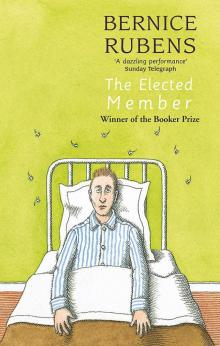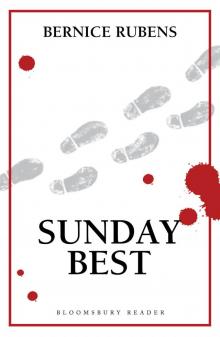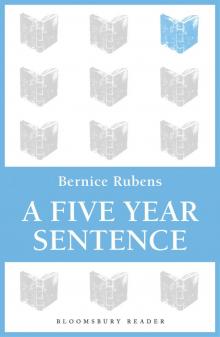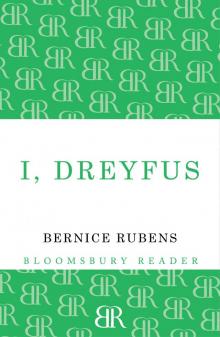- Home
- Bernice Rubens
The Elected Member Page 4
The Elected Member Read online
Page 4
‘Come along now.’ A new figure, another stranger, this time in uniform, came into Norman’s room. ‘Let’s go quietly, shall we,’ it said. ‘We don’t want any fuss.’
‘Look at them,’ Norman was saying, ‘they’re taking me away, and you just stand there and don’t say a word. Papa,’ he said tenderly, ‘what’s the matter with you? Aren’t you well? D’you want to go to bed? Shall I look after you?’
As he was talking, the uniformed stranger came up behind him and motioned Mr Angus to stand by his side. But Norman didn’t feel their movement. ‘He’s not well,’ he said to them without looking up. ‘I must put him to bed and call the doctor.’
Rabbi Zweck looked into Norman’s face and shuddered at the unwitting blackmail of his son’s love and concern. Then, flinging his frail arms around him, he clutched him with a strength that Norman remembered from his mother’s dying embrace. ‘My father must be dying,’ he said to the stranger.
‘Come along now,’ the man said, taking his arm.
‘You’ll need your mackintosh,’ Rabbi Zweck sobbed. ‘Is raining.’
Mr Angus and the stranger took Norman on either side, urging him to go along.
‘Leave me alone,’ Norman shouted. ‘I’ve got to stay home and look after my father.’
The men were losing patience and they grabbed him and dragged him barefoot to the door. Rabbi Zweck saw his son’s empty shoes on the floor. ‘Put your shoes on, put your shoes on,’ he sobbed. He couldn’t bear to see them there, empty. The stranger picked up the shoes and kicked them towards Norman’s feet. Norman slid into them helplessly, his bare shiny heels, sitting on the turned-down leather.
Rabbi Zweck followed them downstairs. From the back his son looked suddenly very old, his black thinning hair sticking out on each side, his dressing-gown hitched up by the men’s grips, his pyjama-legs creased up to his knee. He was astonished to notice the amount of hair on his son’s legs. And possibly for the first time in his life, he acknowledged his son as a grown man, an old man even, old enough, he thought, to die from natural causes.
There were two flights of stairs to the ground floor and into the back entrance of Rabbi Zweck’s little grocer’s shop and general store, which was the only way out into the street. Norman was struggling between the one man’s grasp and the other’s, but he said nothing, sickened by the injustice of it all. They reached the narrow entrance to the shop. Norman’s dressing-gown cord trailed on the floor. Rabbi Zweck bent down and picked it up tenderly, as if he were carrying a bride’s train. Folding the end in front of him, he followed the group into the shop.
Bella was serving a customer, while a group of women waited at the counter. Bella stared at the little procession. She knew she would have to raise part of the counter for them to get through, but she too, wanted no part in his going, and dared not let Norman see her contribution. But the customer who stood by the counter division, an unaccusable bystander, lifted the wood partition, and Bella inwardly blessed her for it. ‘Must you go too?’ she said to her father. Neither of them were concerned about the customers in the shop.
‘Is much harder to stay,’ Rabbi Zweck said.
The three of them had reached the door, and Norman. until now silent, swung round suddenly and faced the customers in the shop. ‘I’ve got witnesses,’ he shouted triumphantly, ‘all of you, you’re witnesses they’re taking me away. They’re putting me in a loony bin,’ he screamed, horrified as the full meaning of his words struck him. ‘You’ll be sorry,’ he shouted to no-one in particular. ‘I’ll sue you, all of you. There’ll be damages.’
Mr Angus and the stranger pulled him into the street, and Rabbi Zweck followed, still holding the cord of his son’s dressing-gown. At the door of his shop, he turned to his customers. ‘I’m sorry you should be embarrassed,’ he whispered.
Bella stared after them. She saw the men handle her brother into the back of a black car, and then the stooped black back of her father as he stumbled in after them. She watched the car out of sight, then she turned back to her customers. ‘It’s raining outside,’ she said.
Chapter 3
The stranger was driving, his back on the alert. Norman sat on the back seat, pinned between Mr Angus and his father, neither of whom, for their .own reasons, dared look at him or at each other. He was calmer now, though Rabbi Zweck thought he felt his own shoulders throbbing with his son’s sobs. He had seen old men cry, and little boys, but never a man. He prayed that the hospital was not far away. Whatever awaited him there, he wanted it over and done with. Out of the window he saw young women shopping, and children, picking out the pavement lines with their toes. He remembered how Norman used to play the same game. He shifted in his seat. His stomach was troubling him. He was aware of a growing physical pain in his body, that seemed to have nothing to do with the horror in his mind. His back ached with a nagging drawing pain, and his stomach contracted from time to time in agonising cramps. He was normally a healthy man, and he couldn’t understand these sudden symptoms. He wondered whether Norman was in pain too. He turned to look at him. Norman smiled, and leaned forward, ostensibly to straighten the heel of his shoe.
But suddenly, when both his keepers were off guard, he put one hand on the door handle and pressed it down. But it snapped back into position and he realised that it was locked from the outside. Not only the attempt, but the failure of it had been witnessed and it was that which humiliated him into a sudden manic urge to escape. He banged on the window. ‘Help, help,’ he cried. A few passers-by gazed at the demented face at the window.
‘Are you all right back there,’ the driver said without turning his head.
Norman was standing now, banging on the window, trying to claim the attention of passers-by.
‘Stop a policeman if you see one,’ Mr Angus ordered the driver.
‘No, no,’ Rabbi Zweck said. ‘Let me try. Norman,’ he pleaded, ‘sit down, please, please, for my sake. Don’t get the policeman,’ he pleaded with Mr Angus. ‘Let me try to manage him.’
Mr Angus had gripped Norman round the waist and was making an effort to get him onto the floor of the car. ‘Grab his legs,’ he shouted to Rabbi Zweck, but Rabbi Zweck couldn’t. In his madness, his son had assumed a remote untouchability, which for Rabbi Zweck was almost holy. He watched helplessly as Mr Angus succeeded in felling Norman to the floor. Then Mr Angus sat back on his seat, and rested his two legs over Norman’s body like a conqueror.
‘Don’t worry about the police,’ Mr Angus told the driver. ‘He’ll be all right now. He brushed down his suit with some annoyance, pressing his foot on Norman’s stomach. ‘Now shut up,’ he said, ‘you’ve been enough trouble already.’ Even for those who dealt professionally with the mad, madmen had sinned, and were to be punished. Rabbi Zweck bent down and stroked his son’s forehead. It was streaming with sweat, and he felt the fever through his fingers. ‘He’s got a temperature,’ Rabbi Zweck said to Mr Angus accusingly.
‘And that’s not all he’s got,’ Mr Angus said.
The houses were disappearing behind them, and the car was soon travelling through a. country road. Rabbi Zweck huddled into his coat, trying to isolate himself from his surroundings, shrinking deep into an anonymous pinpoint of a situation whose reality he could not fathom. But he stared at Norman all the time, pouring into his gaze all his love for his son that he hoped Norman would not misunderstand.
But Norman, lying on the floor, felt no part of him, nor even of himself as an object of his stare or of the offensive boot planted on his stomach. He stared at the roof of the car and the black rexine covering that bubbled and cracked in the corners. As he stared at it, it seemed to descend, embracing him like an easy winding-sheet for his own private and particular dying. That’s what it was like, lying there, an opting out, a withdrawal from all his doubts, a retreat from his own and others’ suspicions, a gentle turning away from all uncertainty. He closed his eyes and gave himself up wholly to the peace and the joy that invaded him. His father looked at h
is face, and watched the slow spreading of his son’s smile. ‘So long he’s happy,’ he thought to himself, and a great tenderness engulfed him. He nudged Mr Angus, inviting him to share his momentary relief. Mr Angus smiled at him. ‘We’re almost there,’ he said, ‘it’ll soon be over.’
But Rabbi Zweck had momentarily forgotten their destination. He shivered at Mr Angus reminder. The car was winding up a narrow country lane, with no signs of habitation on either side, isolated, remote, a foretaste of the greater quarantine.
Norman opened his eyes suddenly. He sensed the prison around him. He tried to get up, but Mr Angus’ boot pressed more firmly on his stomach.
‘Let me out,’ he screamed.
‘You’ll be out soon,’ said Mr Angus. ‘We’re almost there.’ Norman felt the swerving of the car as it turned through the wooded lay-out of the hospital. Then it stopped suddenly, so that Mr Angus had to embed his foot even further into Norman’s stomach, to keep his own balance. For Norman, the sheer physical pain of it momentarily erased its cause, and the man behind the cause, and how the man came to be there and why. Norman knew that behind the pain lay a long uneasy history, partly forgotten but naggingly there. But for the moment, the pain was more than enough for him to deal with and he clutched his stomach as Mr Angus and the driver half dragged him out of the car.
‘What’s the matter? What’s the matter?’ the Rabbi cried, half in hope that at last, something genuine, something tangible could account for his son’s aberrations. ‘Is appendicitis,’ he diagnosed triumphantly. He shouted his findings at the white-coated men who were approaching them down the hospital corridor. ‘You must put him in hospital. Straight away.’
‘We’ll look after him. Don’t worry,’ a male nurse told him. ‘They try all kinds of tricks to get out of here,’ he went on chattily, as if Rabbi Zweck was connected with the new patient in some professional capacity.
‘I’m his father,’ Rabbi Zweck said.
‘Come, sit down,’ the nurse said gently. But Rabbi Zweck did not want to let Norman out of his sight. They reached the ante-room outside the main ward. The room was lined with tables, and pyjamaed, slippered men were carrying pots of tea and plates of bread and butter. They had the infinitely vulnerable look of men in pyjamas, helpless, exposed, unarmed. One of them, a baldheaded man, tapped Norman on the sleeve as he passed him by. A new face in the ward was always an excitement. It presented the possibiFty of variation on other people’s day-to-day monotony of madness. You pt weary of the man who insisted he was a snail, or the man who swallowed everything he laid his hands on. This new arrival might have something of a change to offer. ‘Ullo mate,’ the baldheaded man said. ‘Christ is waiting for you. Put on your pyjamas and I’ll take you to him.’
‘Come off it, Harry. You need morning-dress to go and see Christ,’ said another inmate with the pathetic humour of the mad taking the mickey out of the mad.
The baldheaded man shuffled off with his pot of tea, smiling to himself. Then, as an afterthought, he rushed back to Norman. ‘They think we’re mad,’ he whispered aloud. ‘But I don’t care. Christ only receives mad people, so I don’t want to be not mad.’ He shouted this last to his tea-taking colleagues. Some laughed; others were too withdrawn into themselves even to hear him. He let go of Norman’s sleeve. ‘Hallelujah,’ he shouted, crossing himself with his free hand. Then he skipped between the rows of tables. ‘Hallelujah, I’m a bum, hallelujah, bum again,’ he sang, until a nurse restrained him, patted his back and sat him down on a chair.
Norman’s diminished area of sanity had suddenly become very acute. He looked at his father, embracing both him and his grotesque environment in one glance, and he said, ‘Thank you for what you’ve done to me. Thank you.’ Rabbi Zweck gripped the nearest chair. The nurse helped him sit down.
‘You’ve nothing to blame yourself for,’ he said. ‘You’ve done what’s best for him.’
They led Norman into a little room off the tea-corridor, and Rabbi Zweck saw the door dose behind them. He stared at the stained white table-cloth in front of him. He was aware of a man taking the chair opposite. He saw his dirty-nailed hands place the bread and butter dish on the cloth, and slop the brown tea in the saucer back into the cup. On some of the bread and butter slices, Rabbi Zweck noticed a thin smear of raspberry jam. He was grateful for this minute concession to luxury, and he smiled at the man opposite him. He needed to talk to this man, this older man. He needed to tell someone about his son; he needed to leave a guardian for Norman for the duration of his stay. ‘Is long you’re here?’ he asked timidly.
The old man did not answer.
Rabbi Zweck tried again. ‘Are you going home soon?’ he said.
The man bit into his sandwich and gulped his tea.
‘Are you all right?’ Rabbi Zweck asked.
The man rose from the table, his sandwich still half in his mouth and using his two hands to carry his tea, he walked purposefully down the corridor and disappeared into the ward.
‘Leave me alone. There’s nothing in my pockets.’ Rabbi Zweck heard Norman screaming from behind the door. He got up automatically to go to his son’s help, but as he rose, a nurse came forward to stop him. ‘What are they doing to him?’ Rabbi Zweck whispered.
‘It’s a routine check,’ the arms said. ‘It’s no good if he’s hiding some pills in his pockets, and taking them while he’s here. We have to make absolutely sure.’
Rabbi Zweck nodded. He approved of the procedure. He just could not bear his son’s humiliation. ‘I must find the murderer who sells them to him,’ he promised himself. ‘Or else, he comes out of here and again he starts. I’ll go home, I’ll go through the drawers, I’ll turn inside out everything, I’ll find it, I’ll find it he realised he was talking aloud, and when he looked up, he found that another man, a younger one this time, was sitting opposite him. The man’s nails were dean and manicured, and he held his cup with one hand, while with the other he delicately ate a sandwich. He smiled at Rabbi Zweck. ‘Does your son play chess?’ the man asked. His voice was gentle and his accent well-heeled.
‘Yes,’ Rabbi Zweck said hopefully. Perhaps this man was someone of Norman’s own class.
‘That’s good,’ the man said. ‘I haven’t played a game for six months. That’s when the last player left.’
‘How long you are here?’ Rabbi Zweck was almost afraid to ask.
‘Six months, this time.’
‘This time?’
‘I was here before for a year.’
Rabbi Zweck wanted to find out what was the matter with him. Could he have the same as Norman? Was Norman going to be in and out of this place Like this one?
The man raised his cup to his lips, and as he did so. the sleeve of his silk dressing-gown slipped almost up to his elbow. Around his wrist, Rabbi Zweck saw a circle of red scars, the suicide’s bracelet. He shuddered.
‘I’ll look after your son,’ the man was saying. ‘Don’t worry about him.’
‘He’s not a very good chess player,’ Rabbi Zweck said. He was trying to withdraw the need for the man’s surveillance. ‘As a matter of fact,’ he went on, ‘my son Norman doesn’t like the chess, except on his own to play. That he likes.’ He was about to elaborate on his son’s dislike of partnership, when the door at the end of the tea-room opened and he saw Norman, tamed, beaten, and barefoot, clutching the hand of the male nurse who had met them on arrival. He did not look back in his father’s direction. He was lagging at the nurse’s side as they entered the ward, like a child trailing his mother into the park. Rabbi Zweck stared after him and watched the tail end of his dressing-gown cord as it disappeared round the corner of the door. He didn’t know what to do. He was afraid to go and see Norman, but he was afraid too, to leave. So he sat there, cursing his son’s nameless supplier, and swearing aloud that he would track him down.
After a while, the nurse came out of the ward and walked towards him. ‘You can see your son now,’ he said, ‘just for a little while.’
&
nbsp; Rabbi Zweck hesitated. ‘Don’t worry,’ the nurse said. ‘He’s calm now. We’ve given him a sedative and soon he’ll be asleep.’
‘Did he say I should come?’ Rabbi Zweck asked. ‘Come and see him,’ the nurse said, helping him up from his chair.
Rabbi Zweck was frightened. Supposing Norman didn’t want to see him, and how could he refuse, in bed as he must be, and helpless? And what was there left between them that either of them could put into words? But he couldn’t not go into the ward, and the nurse was already leading him. He didn’t know what to expect behind the closed doors. While he had been waiting, he had seen men come out of there, all with the same expressionless face, all without hope, but hoping all the same.
The room was endless with beds. Ranged on each side with terrifying neatness, some occupied, some heaped with blanket-covered misery, and all in their way absolutely empty. Between the two rows of beds, shuffled slippered men, back and fore, to and fro, as if waiting at a trainless station. Rabbi Zweck wanted to go home. But he had already seen Norman, or rather the huddled shape of him in the bed half-way down the room. Though it looked like any other shape, contained, calm and empty, he knew, by the sudden stab of pain in his groin, that it was his son. The nurse dragged a chair to the side of the bed so that Rabbi Zweck could sit down, and there he left him, alone.
Rabbi Zweck touched the heap on the bed. ‘Norman?’ he said. ‘Is Papa’
There was no movement from under the blanket. Rabbi Zweck thought that perhaps Norman hadn’t heard. He stood up and leaned over the heap. ‘Norman,’ he said again, ‘is Papa.’
‘Take me home,’ Norman whispered.
Rabbi Zweck looked around him. The chess player was on his way towards them, carrying a board. Rabbi Zweck shook his head. ‘Not now,’ he whispered as the man approached. ‘He wants to sleep.’ The chess player shrugged, disappointed. He moved away slowly and joined the group of shufflers between the rows of beds.

 The Elected Member
The Elected Member Sunday Best
Sunday Best Nine Lives
Nine Lives Madame Sousatzka
Madame Sousatzka A Five Year Sentence
A Five Year Sentence I, Dreyfus
I, Dreyfus